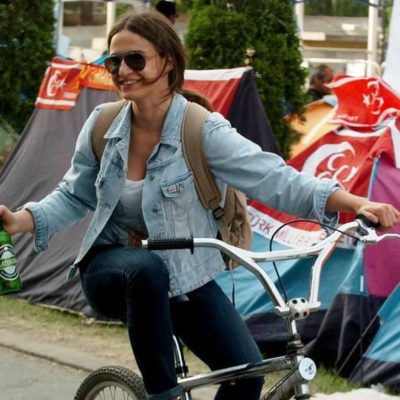
01 Jul Pansy in Napoli or on: the Merry Distress/Anguish of Dispersonalization
by Viki Mladenova
translation by: Julija Micova

Napoli is the city, as Giorgio Agamben presumes, which, if it were Friedrich Nietzsche’s choice for the visit to Italy, instead of Turin, the philosopher, in 1888-89, wouldn’t have gone mad and perhaps wouldn’t have traced those few steps back and embraced the Turin horse.
Napoli is the city of Pulcinella, and also the reason why – according to Agamben – Nietzsche wouldn’t have gone mad had he chosen him as a figure of reference instead of Zarathustra.
And my last impression of the city, midst this attempt to impart my thoughts on Pansy’s performance the other night in Skopje, Napoli is the city where tragic events are infused with joy, where you never either only cry or laugh but rather you do both simultaneously, cry and laugh, in order to live through them. Tiene ment’ a ‘sta mascara: nun vide ca je maje rido e maje chiagno o – pe’ meglio parlà – accussì forte astregno ‘nzieme ‘stì ddoje cose cа cchiù nun se po’ dicere: ‘È chesta! . . . È chella!’ “Bear in mind my mask: you can’t see if I am crying or laughing, or better yet – I link these two things so closely that no one can say: It’s this one! . . . It’s the other one!“ – says Pulcinella. The way he addresses the world is no different than the way Pansy moved through the pain and the map of wounds of those living queer, peripherally, contrary to norm and normal, often condemned and against the rules of the day and the calendar of the small town. His movement through the map of the wounds, the movement behind and on stage accordingly, would inevitably end in a cry dispersed to ease your worries, thereby transforming their state of aggregation into culminating merriness. Pansy also spoke of the mask or the startling layers of make-up (for instance, in the case of drag queens): “we are artists, sculptors and painters,” with a message to everybody – do what you will with yourselves, love whoever you choose, be anything, concluded the master of the night: abandon your persona, create a new one, abandon it as well, (re)create another one… and continue to do so until you accomplish the most important political operation of our time: deactivate the dispositive of the person, the person carrying the legal capacity and incorporating in themselves the logic of exclusion and its expansion in all (un)imaginable forms of violence. The forms of life and a queer world are possible only through the political operation of dispersonalization! The form-of-life as a happy life is necessarily inhabited in a biological-legal-political absolution, in a destabilized, and, until recently, recognizable social status. There is no essence predetermining our destiny, it cannot be sex or gender, the law or rules, the dull aesthetics nor the ethical frame of the nation, because the nation is not the only possible ambiance of togetherness, before and after the nation sparkle numerous forms of being and being-together.
Still, dispersonalization is a problematic political operation, involving both laughter and crying, and yet, everything that’s new is always difficult. Life in Napoli is also difficult, as is the life of the poor working people dressing up as Pulcinella, asking tourists for a euro, two or three, as, finally, it is like to be queer in provincial towns and opposing the being-together of the nation which might possibly hate you, i.e. the law which certainly excludes you. The category of persona, in all probability, is the one most responsible for the political and legal understanding of the occident, mediating all colossal legal and political events providing, from a historiographical aspect, answers to questions on slavery, racism, wars, and other related contemporary forms. Hence, asking queer questions the answers to which can be found in the characters of Pulcinella and Pansy seems quite inappropriate. This is so due to the political custom of conflict and enmity, militarized options of conquering the political space.
“In people’s life – this is the doctrine [of Pulcinella] – the most important is to find an exit.” (Agamben 2015: 45). The exit, since it leads somewhere else and has no precise and previously established destination, is also an interruption, split, an escape from the current and a passage to the new. Or, in Pulcinella’s words: Ubi fracassorium, ibi fuggitorium (Where there is a catastrophe, there is an escape). Namely, the exit from the map of the wounds, can surprisingly be glittery, and most of all playful, as confirmed by Pansy. Agamben and some of his interpreters also insist on this: if conflict in politics is activated through war, then play – as an opposite political action – disactivates it (l’inoperosità del conflitto). The play is alive, successful and takes place on the threshold of a different world, life and community. Pansy, at midnight on 15-16 June, 2019, succeeded in presenting and prophesying another world to live in.
And so we shall!
I wanted to dedicate the last paragraph of this text with “I dedicate this to…”, however one cannot dedicate a text to the registry of so many new words, tingles, experiences, joys along with fears, glances and sensations. This text exists precisely because of this and such registry, and it has a name – that name is Slavco Dimitrov.
My most sincere compliments for the work of the main curator Slavco, his team, Stefi, Ena, Bubi and Jana, the life-giving festival of queer culture and art Glittering Wounds (2019, Skopje Pride Weekend). Pansy’s performance in Skopje was scheduled as the last event in the Glittering Wounds program – Drag Show: Berlin-Belgrade-Skopje.
This text was originally published on meduza.mk
